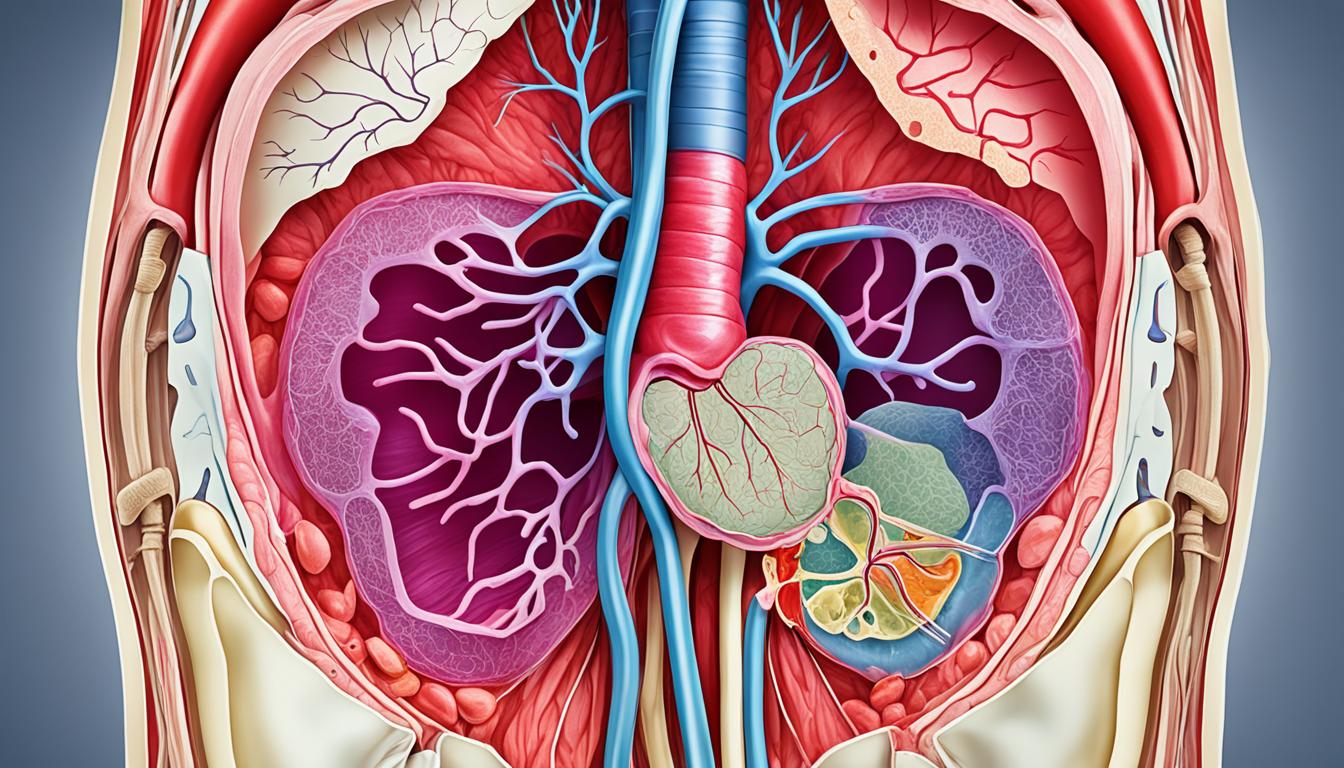Ureteral obstruction happens when something blocks the ureter, a tube from the kidney to the bladder. This blockage can come from kidney stones, strictures, or tumors. It stops the flow of urine, which causes problems.
A person may feel intense pain in their back or side along with blood in their urine. Getting lots of urinary infections is a sign too. If you have these symptoms, it’s crucial to see a doctor.
To find out if the ureter is blocked, doctors use imaging tests like ultrasound or MRI. These let them see what’s going on inside. Catching the issue early is key to finding the best way to treat it.
Recently, stem cell therapy has shown promise for ureteral obstruction. Stem cells can turn into many different cell types, even ureter cells. They might help fix the ureter, offering new hope for patients.
Stem cell therapy could improve how symptoms are managed and bring long-term relief for those with ureteral obstruction.
Key Takeaways:
- Ureteral obstruction is a condition characterized by a blockage or obstruction in the ureter.
- Common causes include kidney stones, ureteral strictures, and tumors.
- Symptoms can include severe back or side pain, urinary tract infections, and blood in the urine.
- Diagnosis is typically done through imaging tests like ultrasound, CT scan, or MRI.
- Stem cell therapy is an emerging treatment option for ureteral obstruction, offering potential relief and recovery.
Causes and Symptoms of Ureteral Obstruction
Ureteral obstruction can happen for many reasons. It often leads to a blockage in the ureter. This can cause problems in the urinary tract. Kidney stones usually cause this blockage. When they get stuck in the ureter, they stop urine from passing through. This blockage can make urine back up into the kidney, causing hydronephrosis. Ureteral strictures, or narrowings, and tumors can also block urine flow.
The signs of ureteral obstruction change based on the blockage’s seriousness and location. The most recognizable symptom is intense back or side pain, known as renal colic. This pain can be sharp and spread to the lower abdomen and groin. You might also notice more urinary tract infections. This is because the blockage can lead to more bacteria. Blood in the urine might be seen too, due to irritation from the blockage.
Complications of Ureteral Obstruction
Without treatment, ureteral blockage can lead to serious problems. It can harm the kidney and reduce its function. This might cause chronic kidney disease or even kidney failure. It can also lead to more urinary tract infections. This raises the chance of a life-threatening infection called sepsis. Early diagnosis and the right treatment are key to avoiding these issues and keeping the kidney working properly.
| Causes of Ureteral Obstruction | Symptoms of Ureteral Obstruction |
|---|---|
| Kidney stones | Severe back or side pain (renal colic) |
| Ureteral strictures | Urinary tract infections |
| Tumors or growths | Blood in the urine (hematuria) |
Diagnosis and Stem Cell Therapy for Ureteral Obstruction
Doctors diagnose ureteral obstruction with tests like ultrasound, CT scan, or MRI. These tests show any blockages in the ureter clearly. This makes for an accurate diagnosis. The treatment used depends on how serious the condition is.
For mild cases, doctors may suggest being careful. This means taking pain medicine, drinking plenty of water, and having check-ups. The goal is to keep the issue from getting worse. But, if the problem is big and causing a lot of trouble, surgery might be needed.
Stem cell therapy is becoming a hopeful option for treating ureteral obstruction. Stem cells can turn into many cell types. They’re used to help the ureter heal. This treatment could give better results over time. Plus, it might help patients feel better for longer. Even though using stem cells is still new for this issue, studies are looking positive. This makes it an exciting chance for urologists to help more people.

